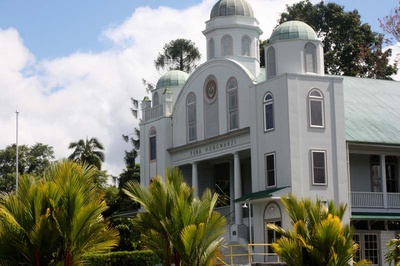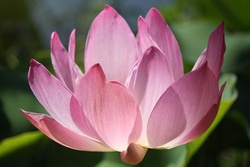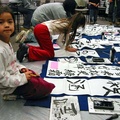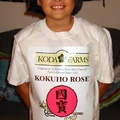I see in the Hawaii Tribune-Herald newspaper that novelist Lois-Ann Yamanaka is reading at the Kinoole Farmer’s Market. “Jean Yamanaka” is the contact name, so she must be in town visiting her mom or other relatives. I love her work and plan to go, excitedly gathering up all her novels to ask her to sign.
But instead, the books bake in my car as I let myself get caught up with the older Japanese American ladies at the Jodo Shinshu Buddhist temple.
I thought I could go to services 9-10 and then cut out quickly to go to the reading from 10-11:30, but there is no escaping the Aunties at temple. The first time we ever went to this temple, they ran out after us into the parking lot and physically pulled the kids out of the car one by one, insisting we stay for lunch.
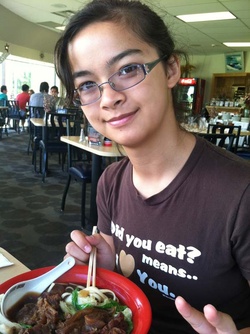
The iconic Blacklava T-shirt, “Did you eat? means…I love you.” And yet another bowl of beef noodle soup… (Photo by Frances Kai-Hwa Wang)
Today, they take four-year-old Little Brother by the hand and lead him down to the Fellowship Hall where they load his plate full of blueberry cake, potato chips, lilikoi cookies, purple potato tempura, multi-layered jello, purple potato manju, and fresh lychee. One Auntie is concerned, “He has a cold.” I look at his face and wipe his nose, “No, that’s whipped cream.”
The older Japanese Aunties all talk to me in Japanese. Somehow, I remember enough words from my one semester of college Japanese to be able to respond (for just a few precious volleys). “Doko desuka?” “Keaau desu.”
The two questions all the Aunties ask are: “Where do you live?” and “Who are your parents?” Nobody cares about what my name is or what I do or where I work. I like that.
I do not expect any of them to know my parents, but one of the Aunties finally figures out the connection. She knows who my father is. Then, of course, everybody else knows too. She lives next door to my father’s rental house in Pahoa, and quickly calls over the family who used to live there (it was owned by the man’s father, a master carpenter, who first came from Japan at age 14, what, 100 years ago?). They tell me about all the citrus trees on the property, including their prized Okinawan tangerines. Everybody even knows all about the big family of renters and that they had recently moved out.
My father later tells me that when he first bought the house, all the neighbors came to meet him and tell him about when the whole street was young Japanese American families in their 20s, just starting out, just leaving the plantations.
I love the small-town-ness of it all. Everybody knows everything about everyone. You only exist in the context of your family. I think of Lois-Ann Yamanaka with awe as a big-name novelist, but here, she is no different than me, forever the child of our parents. I miss that sometimes in our anonymous modern lives as proud individuals in distant cities standing completely alone on our own accomplishments, which suddenly seem to pale against the question, “Who is your father?”
* An earlier version of this essay was originally published at PacificCitizen.org.
© 2012 Frances Kai-Hwa Wang


